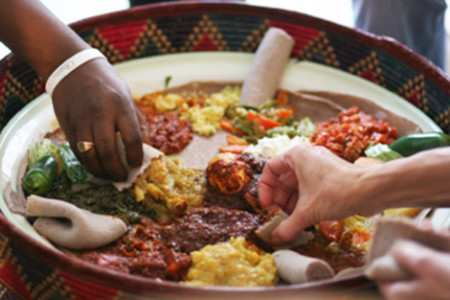Food. One of the few things that is both vital for human sustenance and a massive part of a nation’s and individual’s cultural heritage. In several parts of Africa, food plays an important role in various traditions and celebrations, and many of the delicacies have made their way across the globe through various diasporans holding on tightly to their favourite jollof rice recipes. While Europeans may look on in confusion at our orange rice and spicy stews (British chef Jamie Oliver certainly did after he received backlash for his attempt at making jollof rice) a recent study has revealed that adopting an African diet, specifically a South African one, will not only delight your taste buds, but can also help in preventing deadly colon cancer.
The study, which was conducted by London’s Imperial College and the University of Pittsburgh looked at the effects one’s diet has in potentially developing bowel cancer. Twenty African-American participants, whose diets were rich in protein and saturated fats, swapped diets with a group of 20 rural South Africans, who ate mostly beans and vegetables. Prior to the diet swap, researchers tested the microbes living in the gut of each of the participants. They found that the South Africans had a high level of gut microbiota which aid in the fermentation of carbohydrates as well as microbes that produce butyrate which is essential for digestion. Meanwhile the African Americans had more microbes that break down bile acid. They were also found to have several polyps, small growths, which can sometimes develop into cancer. African-Americans are one of the most at risk groups when it comes to developing colon cancer, and are 100 times more likely to develop colon cancer than their South African counterparts. In the UK the deadly disease kills around 16,000 people a year.
During the diet swap, which took place over the course of two weeks, the twenty South African participants ate a high fat, high protein diet of sausages, burgers and fries. The African-Americans switched over to a diet that was higher in fibre which included foods like bean soup, fish tacos and mango slices. The results following the experiment were remarkable. While the African Americans colons were less inflamed than they were when they first began, and were showing less of the signs that signalled a risk of developing colon cancer, the South African’s risk factors significantly increased despite the fact that they had shown no risk factors before the experiment.
“We were astounded at the degree of change,” Stephen O’Keefe, who led the study, said. “We thought we’d find a few changes here and there when they swapped diets, but this mirror image was totally unexpected.”
While the study does reveal significant changes that one’s diet can make in both reducing the and increasing the risks of colon cancer, the scientists who conducted the study note that they cannot be certain that South Africans would have developed colon cancer if they continued with the new diet as the study was too short. However, according to Jeremy Nicholson, one of the lead authors of the study, the results do give significance evidence that supports the idea that our diets play a significant role in the health of our colons.
“What is startling to me is how profoundly the microbes, metabolism and cancer risk factors change in just two weeks of diet change. It means to me that diet and environment and microbial genes are likely to be much more important than individual human genes in determining individual colonic cancer risks,” he said.
“Certainly it shows that your possible fate is not just determined by the genetic dice at birth. How you roll the dice in the game is probably more important.”











